Related Research Articles
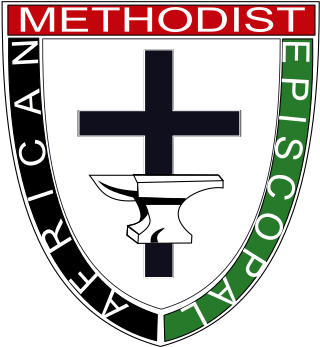
The African Methodist Episcopal Church, usually called the AME Church or AME, is a Methodist denomination based in the United States. It adheres to Wesleyan-Arminian theology and has a connexional polity. It cooperates with other Methodist bodies through the World Methodist Council and Wesleyan Holiness Connection.

The Christian Methodist Episcopal Church (C.M.E.C.) is a Methodist denomination that is based in the United States. It adheres to Wesleyan-Arminian theology. Though historically a part of the black church, the Christian Methodist Episcopal today has a church membership of people from all racial backgrounds.

The African Methodist Episcopal Zion Church, or the AME Zion Church (AMEZ) is a historically African-American Christian denomination based in the United States. It was officially formed in 1821 in New York City, but operated for a number of years before then. The African Methodist Episcopal Zion Church adheres to Wesleyan-Arminian theology.

Circuit riders, also known as horse preachers, were clergy assigned to travel around specific geographic territories to minister to settlers and organize congregations. Circuit riders were clergy in the Methodist Episcopal Church and related denominations, although similar itinerant preachers could be found in other faiths as well, particularly among minority faith groups. They were most prominent during the early years of the United States, from 1784–1830, and were part of the Second Great Awakening revival movement.
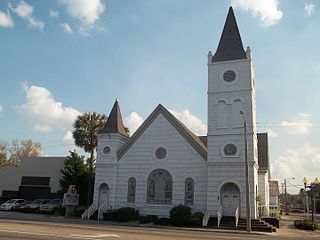
The black church is the faith and body of Christian denominations and congregations in the United States that predominantly minister to, and are also led by African Americans, as well as these churches' collective traditions and members. The term "black church" may also refer to individual congregations, including in traditionally white-led denominations.

Daniel Alexander Payne was an American bishop, educator, college administrator and author. A major shaper of the African Methodist Episcopal Church (AME), Payne stressed education and preparation of ministers and introduced more order in the church, becoming its sixth bishop and serving for more than four decades (1852–1893) as well as becoming one of the founders of Wilberforce University in Ohio in 1856. In 1863, the AME Church bought the college and chose Payne to lead it; he became the first African-American president of a college in the United States and served in that position until 1877.
A district superintendent (DS), also known as a presiding elder, in many Methodist denominations, is a minister who serves in a supervisory position over a geographic "district" of churches providing spiritual and administrative leadership to those churches and their pastors.
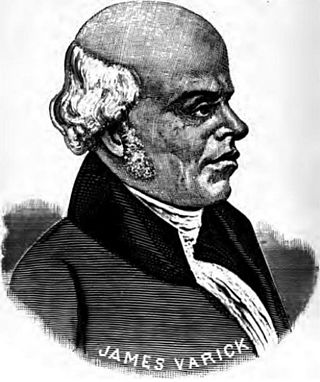
James Varick was the first Bishop of the African Methodist Episcopal Zion Church.
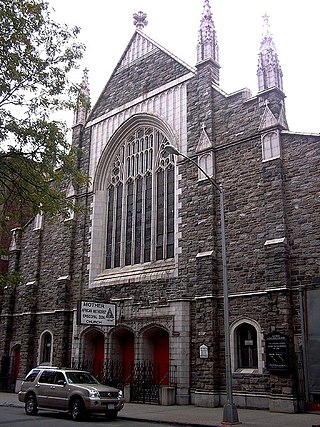
The Mother African Methodist Episcopal Zion Church, also known as "Mother Zion", located at 140–148 West 137th Street between Adam Clayton Powell Jr. Boulevard and Lenox Avenue in the Harlem neighborhood of Manhattan, New York City, is the oldest African-American church in New York City, and the "mother church" of the African Methodist Episcopal Zion conference.
Hosea Easton (1798–1837) was an American Congregationalist and Methodist minister, abolitionist activist, and author. He was one of the leaders of the convention movement in New England.

Hood Theological Seminary is a Christian seminary sponsored by the African Methodist Episcopal Zion Church in Salisbury, North Carolina. It is a graduate and professional school sponsored by the African Methodist Episcopal Zion Church and approved by the University Senate of The United Methodist Church. From its founding in 1879 until 2001, the seminary was part of Livingstone College; it is now independent. The seminary is accredited by the Association of Theological Schools in the United States and Canada.

The history of Methodism in the United States dates back to the mid-18th century with the ministries of early Methodist preachers such as Laurence Coughlan and Robert Strawbridge. Following the American Revolution most of the Anglican clergy who had been in America came back to England. John Wesley, the founder of Methodism, sent Thomas Coke to America where he and Francis Asbury founded the Methodist Episcopal Church, which was to later establish itself as the largest denomination in America during the 19th century.
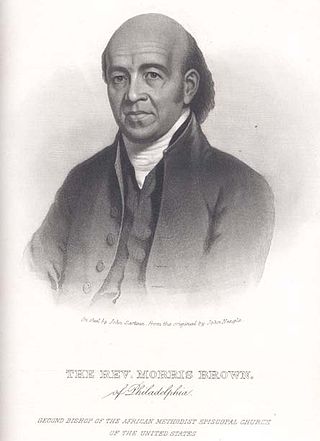
Morris Brown was one of the founders of the African Methodist Episcopal Church, and its second presiding bishop. He founded Emanuel AME Church in his native Charleston, South Carolina. It was implicated in the slave uprising planned by Denmark Vesey, also of this church, and after that was suppressed, Brown was imprisoned for nearly a year. He was never convicted of a crime.
Jeffery Tribble is an ordained elder in the African Methodist Episcopal Zion Church and a professor of ministry with research interests in Practical Theology, Congregational Studies and Leadership, Ethnography, Evangelism and Church Planting, Black Church Studies, and Urban Church Ministry. Academics and professionals in these fields consider him a renowned thought leader. Tribble's experience in pastoral ministry allows for his work to bridge the gap between academic research and practical church leadership.
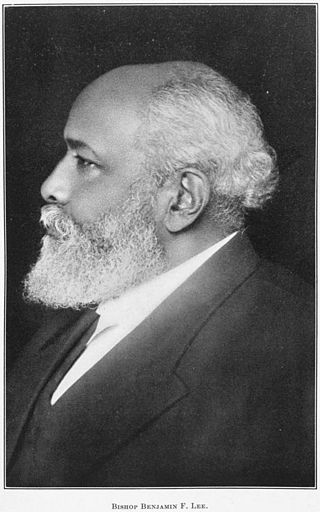
Benjamin Franklin Lee was a religious leader and educator in the United States. He was the president of Wilberforce University from 1876 to 1884. He was editor of the Christian Recorder from 1884 to 1892. He was then elected a bishop in the African Methodist Episcopal (AME) church, serving from 1892 until his resignation in 1921, becoming senior bishop in the church in 1915.
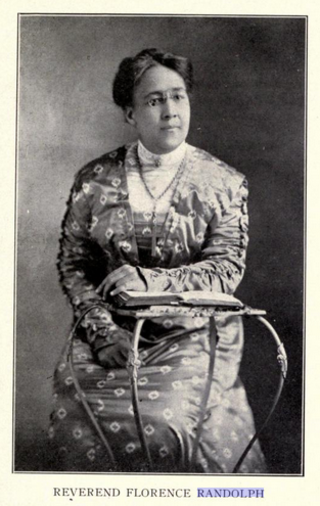
Florence Spearing Randolph was an American clubwoman, suffragist, and ordained minister, pastor of the Wallace Chapel AME Zion Church in Summit, Union County, New Jersey, United States. from 1925 to 1946. She organized the New Jersey Federation of Colored Women's Clubs and was president of the New Jersey Women's Foreign Missionary Society.
Love in Syncopation is a 1946 musical comedy film released in the United States. The film featured Henri Woode and his band as well as Ruby Dee. Leonard Anderson directed and William D. Alexander produced. The film features dance and musical performances including by the Congaroos.

Bishop Singleton T. Jones was a religious leader in the African Methodist Episcopal Zion Church. Although he had little education, Jones taught himself to be an articulate orator and was awarded the position of bishop within the church. Besides being a pastor to churches, he also edited AME Zion publications, the Zion's Standard and Weekly Review and the Discipline.
Rev. John E. Price was an elder and minister of the African Methodist Episcopal Zion Church. He was a minister for around 50 years. He was the founder and president of the Garnet Equal Rights League at Harrisburg. He wrote hymns and was an editor for the Zion Church Advocate and, with William H. Day, the Zion Church Herald and Outlook, the first paper of the AME Zion Church. Day was a minister, abolitionist, and educator.

Arthur L. Hardge was an American civil rights movement leader, a minister in the African Methodist Episcopal Zion Church, and a University of Rhode Island administrator. In 1968, he became Rhode Island's first African American cabinet member when Governor John Chafee appointed him to serve as director of the Rhode Island Department of Community Affairs.
References
- ↑ Smith, Jessie Carney (December 2012). Black Firsts: 4,000 Ground-Breaking and Pioneering Historical Events. ISBN 9781578594252.
- 1 2 Grant, Edmond (August 21, 1999). The Motion Picture Guide: 1999 Annual (The Films of 1998). CineBooks. ISBN 9780933997431 – via Google Books.
- ↑ Bradley, David Henry (1956). A History of the A.M.E Zion Church. Parthenon Press. p. 8. ISBN 9781532688270.
- ↑ "Red River Valley Historical Review". Red River Valley Historical Association. August 21, 1981 – via Google Books.
- ↑ "Black Houston" (PDF). Texas Observer . May 13, 1966. Retrieved August 21, 2020.
- ↑ Jones, George William (August 21, 1991). Black Cinema Treasures: Lost and Found. University of North Texas. ISBN 9780929398266 – via Google Books.
- ↑ "Harrel G. Tillman, Former Judge, Dies at 73". New York Times . June 28, 1998. Retrieved August 21, 2020.